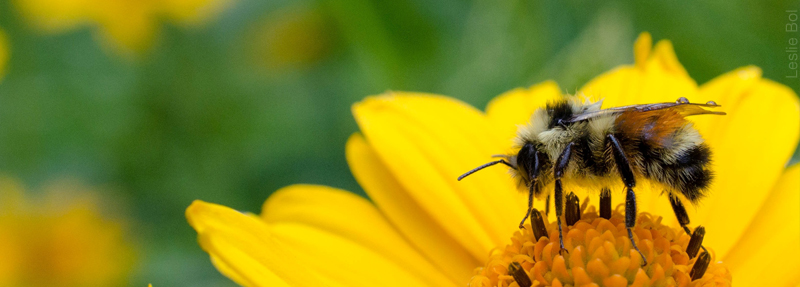
Bee the voice for pollinator protection
As you know, many of Ontario’s bees are suffering rapid declines due to habitat destruction, exposure to pesticides like neonicotinoids, and other stressors. The Government of Ontario is proposing to reduce the use and sale of neonicotinoids and to develop a Pollinator Health Action Plan to improve the state of pollinators in the province. Public comments on the proposal are due on January 25, 2015 (Environmental Registry #012-3068).
The proposed reduction in neonicotinoids will focus on seed treatments for corn and soybean. Currently, almost 100 percent of corn and about 60 percent of soybean seeds are treated with this harmful pesticide. The government plans to regulate the use and sale of these treated seeds to achieve an 80 percent reduction by 2017.
Ontario Nature fully supports this target, a reasonable first step to address the threats that these pesticides pose to human and ecosystem health.
The proposed Pollinator Health Action Plan will address pesticide exposure and other major threats to pollinators, including habitat loss and degradation, the impacts of climate change and severe weather events, disease and pests.
Ontario Nature fully supports Ontario’s plan to address the health of all pollinators as well as a wide variety of threats. At the same time, we are mindful of the challenge that some of these changes will pose for farmers. Please join us in urging the government to:
- Proceed with the plan to reduce the use of neonicotinoids by 80 percent by 2017;
- Maintain a broad scope (addressing all pollinators, multiple threats);
- Ensure that the necessary support is in place to enable farmers to transition to other means of pest management (untreated seeds, credible information on the impacts of neonicotinoids, expert government advice and assistance with implementing alternatives);
- Support incentives and recognition programs that promote the preservation and restoration of pollinator habitats;
- Invest in research about pollinator-friendly farming practices and the economic value of supporting pollinators for farmers and their crops; and
- Plan to move towards a full ban on neonicotinoids and other harmful pesticides.
Remember, the deadline for comments is January 25, 2015.
To read the government’s discussion paper, click here
To learn more about Ontario Nature’s Pollinator Campaign, including the efforts of our provincial Youth Council click here.